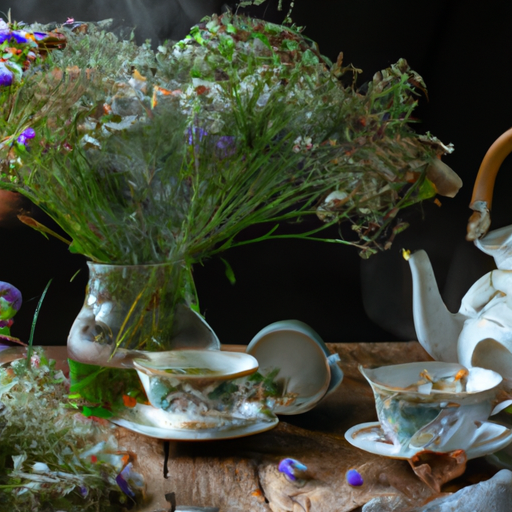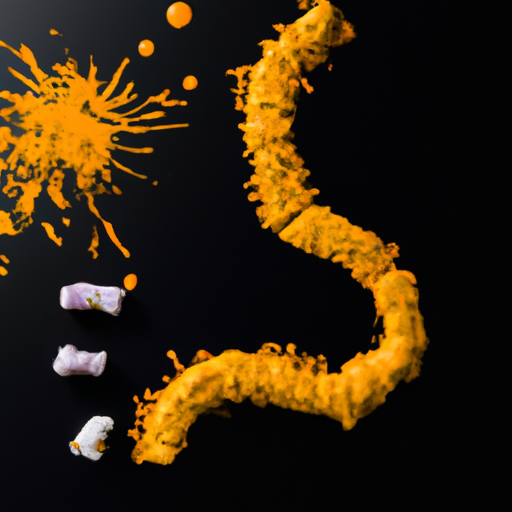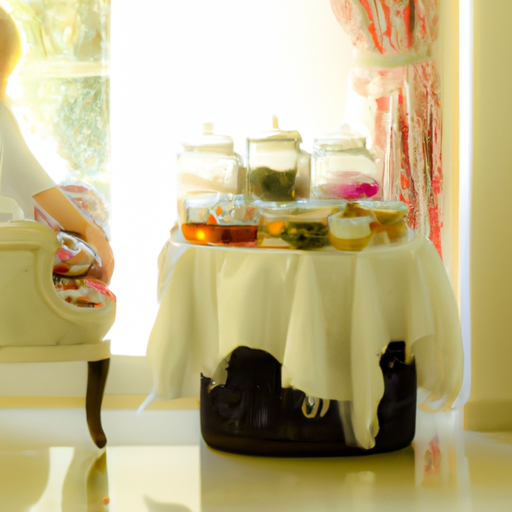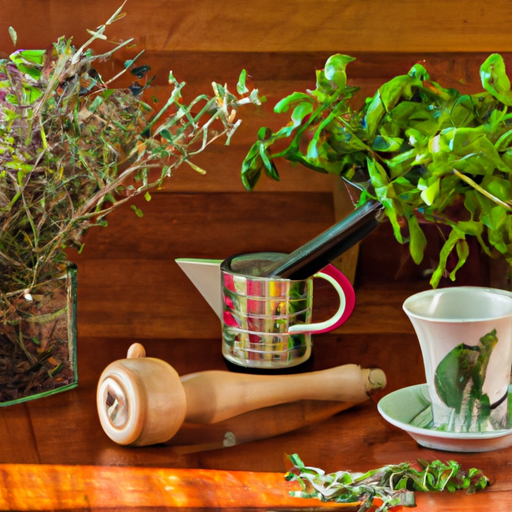Imagine stepping into a world of tranquility, where time slows down and your senses come alive. Picture yourself surrounded by the gentle aroma of herbs, the soothing sound of boiling water, and the warmth of a teacup in your hands. Welcome to the enchanting realm of the herbal tea ceremony, a sacred ritual that nourishes both body and soul.
In this article, I will guide you through the art of creating your own herbal tea ceremony, a practice that has been cherished for centuries. With a blend of knowledge, precision, and a touch of mindfulness, you will learn how to set the perfect atmosphere, choose the ideal tea blend, and prepare it with utmost care.
We will explore the power of savoring each sip, practicing mindfulness and meditation, and reflecting on our experiences through journaling.
Join me on this journey as we unlock the secrets of the herbal tea ceremony, incorporating rituals and traditions that will transport you to a place of deep relaxation and inner peace.
Let’s begin this transformative experience together.
Key Takeaways
- Creating a calming atmosphere with soft lighting and soothing music is essential for an herbal tea ceremony.
- Choosing the right music can enhance the overall experience of the tea ceremony.
- Consider flavor profile, ingredients, and health benefits when selecting an herbal tea blend.
- Using fresh filtered water and following the recommended steeping time ensure the best taste and quality of the tea.
Set the Atmosphere for Relaxation
To truly create a calming atmosphere for your herbal tea ceremony, it’s essential to set the mood with soft lighting and soothing music. Mindful breathing and calming music can help create a sense of relaxation and tranquility as you prepare for your tea ceremony.
Before you begin, find a quiet space where you won’t be interrupted, and dim the lights to create a cozy ambiance. As you settle in, take a few moments to focus on your breath, inhaling deeply and exhaling slowly. This will help you center yourself and find a sense of calm.
In addition to the soft lighting and mindful breathing, choosing the right music can enhance the overall experience. Consider playing gentle, instrumental melodies that promote relaxation and mindfulness. This can help create a peaceful and serene environment for your tea ceremony.
Now that you have set the atmosphere for relaxation, it’s time to move on to the next step: choosing the perfect herbal tea blend. The tea you select will play a crucial role in the overall experience, so it’s important to choose one that aligns with your preferences and desired benefits.
Choose the Perfect Herbal Tea Blend
When it comes to selecting the ideal herbal tea blend, it’s all about finding the perfect match for your taste buds and preferences. Tea selection is a personal choice, and there are countless options available to suit different flavor preferences. Whether you enjoy floral notes, earthy tones, or refreshing citrus flavors, there is a herbal tea blend out there for you.
To help you choose the perfect herbal tea blend, consider the following factors:
-
Flavor Profile: Think about the flavors you enjoy. Do you prefer a light and delicate tea or a bold and robust one? Consider whether you like herbal teas with a hint of sweetness or those with a more savory taste.
-
Ingredients: Take a look at the ingredients used in the blend. Some popular herbal tea ingredients include chamomile, lavender, mint, hibiscus, and ginger. Read the descriptions and choose a blend that appeals to your taste buds.
-
Health Benefits: Many herbal teas offer various health benefits. For example, chamomile is known for its calming properties, while ginger can aid digestion. Consider what benefits you are looking for in your herbal tea.
By considering these factors, you can find the perfect herbal tea blend that matches your preferences. In the next section, we will discuss how to prepare the tea with care, ensuring that you get the most out of your herbal tea experience.
Prepare the Tea with Care
When it comes to preparing herbal tea, two key points to keep in mind are using fresh filtered water and following the recommended steeping time.
As a tea enthusiast, I know that using fresh filtered water ensures the best taste and quality of the tea. Additionally, following the recommended steeping time allows the flavors and beneficial properties of the herbs to fully infuse into the water, resulting in a perfect cup of herbal tea.
Use Fresh Filtered Water
Using fresh, filtered water ensures a pure and invigorating brew for your herbal tea ceremony. It’s important to start with high-quality ingredients, and water is no exception. Tap water may contain impurities that can affect the taste and quality of your tea. By using filtered water, you remove any unwanted chemicals or contaminants, allowing the true flavors of the herbs to shine through.
Additionally, the temperature and mineral content of tap water can vary, which can affect the brewing process. Different brewing methods may require specific water temperatures, and using fresh, filtered water ensures that you have more control over this variable.
So, when preparing for your herbal tea ceremony, be sure to start with fresh, filtered water for a truly delightful and satisfying experience.
Now, let’s move on to the next important step: following the recommended steeping time.
Follow the Recommended Steeping Time
It’s crucial to adhere to the recommended steeping time, as it acts as the conductor of the symphony, orchestrating the perfect balance of flavors in your brew.
The benefits of herbal tea are vast, ranging from soothing the mind and body to boosting the immune system. Steeping time plays a vital role in unlocking these benefits.
Each herb requires a specific amount of time to release its flavors and therapeutic compounds. Longer steeping times can result in a bitter taste, while shorter times may not fully extract the herb’s essence.
It’s also important to consider the steeping temperature. Different herbs require different temperatures to bring out their optimal flavors.
By following the recommended steeping time and temperature, you can ensure a delightful and healthful cup of herbal tea.
Transitioning into the next section, practicing mindfulness and meditation during your tea ceremony adds an additional layer of tranquility to the experience.
Practice Mindfulness and Meditation
When it comes to practicing mindfulness and meditation, there are two key points to keep in mind.
First, it’s important to focus on the present moment, allowing your mind to be fully engaged with what’s happening right now.
Second, engaging your senses can help you fully immerse yourself in the experience. This means paying attention to the sights, sounds, smells, or tastes around you.
By incorporating these practices into your daily routine, you can cultivate a greater sense of awareness and peace.
Focus on the Present Moment
In the midst of the herbal tea ceremony, let yourself fully immerse in the present moment, savoring each sip as if time stood still. By focusing on the present moment during this mindful practice, you can experience a plethora of benefits.
Mindfulness techniques, such as deep breathing and observing your thoughts without judgment, can help you cultivate a sense of calm and relaxation. Being fully present allows you to let go of worries about the past or the future, and instead, appreciate the simple pleasure of sipping herbal tea. This practice can enhance your ability to concentrate and reduce stress levels.
As you continue to engage in the herbal tea ceremony, you can further enhance your experience by engaging your senses, allowing the aroma, taste, and warmth of the tea to envelop you.
Engage Your Senses
After focusing on the present moment, it’s time to dive deeper into the sensory experience of an herbal tea ceremony. Engaging your senses is a key component of this mindfulness practice.
As you prepare your tea, take a moment to appreciate the aroma of the herbs as they steep in the hot water. The scent alone can transport you to a place of tranquility and relaxation.
Once your tea is ready, take a moment to observe its color, noticing the variations and nuances that each blend offers.
As you take your first sip, pay attention to the taste on your tongue, the warmth that spreads through your body, and the soothing sensation it brings.
This sensory experience is an integral part of the herbal tea ceremony, allowing you to fully immerse yourself in the present moment and savor the tea slowly, allowing its flavors to unfold and awaken your senses.
Savor the Tea Slowly
To truly savor the herbal tea, take the time to leisurely sip and appreciate each delightful sip. Savoring flavors is an art that requires mindfulness and intentionality. Engage all your senses as you bring the warm cup of tea to your lips.
Close your eyes and inhale the fragrant aroma, allowing it to envelop your senses. As you take that first sip, let the taste linger on your tongue, savoring the intricate blend of herbs and spices. Notice the subtle notes and flavors that emerge with each sip.
Mindful sipping allows you to fully experience and appreciate the tea’s complexity. Take small sips, allowing the flavors to coat your palate and awaken your taste buds. Pay attention to the way the tea feels in your mouth – its temperature, texture, and body. Notice how the flavors evolve as the tea cools down or as you take subsequent sips.
As you savor the tea slowly, it becomes an opportunity for contemplation and reflection. Allow yourself to be fully present in the moment, embracing the peacefulness and tranquility that the tea ceremony offers. Reflect on the sensations, thoughts, and emotions that arise as you indulge in this meditative experience.
Soon, you’ll be ready to transition into the next section about ‘reflect and journal,’ where you can capture these moments of mindfulness and further explore the depths of your tea ceremony journey.
Reflect and Journal
Take a moment to reflect on your tea experience and journal about the profound impact it has had on your senses and state of mind. The act of reflecting on your tea ceremony can provide numerous benefits. It allows you to fully appreciate the flavors, aromas, and textures of the herbal tea you have just enjoyed. By reflecting, you become more aware of the present moment and can savor the experience on a deeper level. Furthermore, reflecting on your tea ceremony can help you gain insights into your own thoughts, feelings, and emotions.
Journaling is an excellent technique to capture these reflections and insights. It allows you to put your thoughts and experiences into words, helping you to process and understand them better. You can use your journal as a tool for self-discovery and personal growth. It is a private space where you can freely express your thoughts and emotions without judgment.
To further enhance your journaling experience, I recommend incorporating a three-column, three-row table. In the first column, write down the specific herbal tea you drank. In the second column, describe the sensory experiences you had, such as the taste, aroma, and texture. In the third column, jot down any thoughts, emotions, or insights that arose during the tea ceremony. This table can serve as a visual representation of your tea journey and help you identify patterns or themes in your reflections.
By reflecting and journaling, you can deepen your connection with herbal tea and gain a better understanding of yourself. Next, we will explore how to incorporate rituals and traditions into your tea ceremony.
Incorporate Rituals and Traditions
Embracing rituals and traditions adds a touch of nostalgia and cultural richness to the tea experience, transporting you to a world of ancient customs and timeless elegance. When it comes to having an herbal tea ceremony, incorporating rituals and traditions can elevate the experience to a whole new level.
The ritual significance of certain actions and practices can deepen your connection with the tea and create a sense of mindfulness and intention. One ritual that holds great cultural symbolism in tea ceremonies is the art of preparing the tea. Taking the time to measure the tea leaves, heat the water to the perfect temperature, and steep it for the right amount of time demonstrates a respect for the process and an appreciation for the tea’s flavors and aromas. This act of mindfulness allows you to fully immerse yourself in the present moment and savor each sip.
Another tradition to consider is the use of specific teaware. Choosing teacups, teapots, or tea bowls that hold cultural significance can enhance the overall experience. For example, using a traditional Japanese matcha bowl or a Chinese Yixing teapot can bring a sense of authenticity to the ceremony, connecting you to the rich history and traditions of these cultures.
Incorporating rituals and traditions into your herbal tea ceremony not only adds a sense of beauty and elegance but also fosters a deeper appreciation for the tea itself. By embracing these customs, you become a part of a larger narrative, honoring the ritual significance and cultural symbolism that tea has held for centuries.
Frequently Asked Questions
What are some common rituals and traditions to incorporate into an herbal tea ceremony?
Common rituals and traditions to incorporate into an herbal tea ceremony include using common tea accessories such as teapots and cups, as well as cultural variations that may involve specific gestures or chants.
How can I choose the perfect herbal tea blend for my tea ceremony?
Choosing tea blends for an herbal tea ceremony is essential for a delightful experience. Consider the desired benefits, such as relaxation or energy boost, and select herbs like chamomile for calmness or peppermint for invigoration.
Is it necessary to practice mindfulness and meditation during an herbal tea ceremony?
Practicing mindfulness and meditation during an herbal tea ceremony is not necessary, but it can enhance the experience. They offer benefits like increased relaxation and focus. However, there are alternative practices for those who prefer a different approach.
What are some tips for savoring the tea slowly and fully enjoying the flavors?
To fully enjoy the flavors of herbal tea, try these savoring techniques. Take small sips, allowing the flavors to linger on your tongue. Pay attention to the different notes and aromas as you slowly savor each sip.
How can I enhance the atmosphere for relaxation during an herbal tea ceremony?
To enhance the atmosphere for relaxation during an herbal tea ceremony, I create a calming environment by dimming the lights, playing soothing music, and surrounding myself with soft pillows and blankets. This helps me fully immerse in the experience and find inner peace.
Conclusion
In conclusion, having an herbal tea ceremony is a wonderful way to create a moment of tranquility and self-care. By setting the right atmosphere, choosing the perfect blend, and preparing the tea with care, you can indulge in a sensory experience that calms both the body and mind.
Practicing mindfulness and savoring the tea slowly allows you to fully appreciate its flavors and benefits. Reflecting and journaling afterwards helps to deepen the experience, while incorporating rituals and traditions adds a touch of magic.
So go ahead, create your own herbal tea ceremony and enjoy a moment of blissful relaxation.










